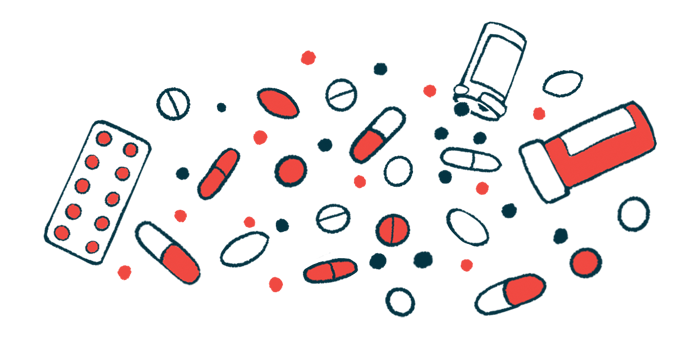Difficulty Swallowing Medications Tied to Motor Problems in Study
Dysphagia for food found to be a predictor of same difficulties for medications
Written by |

Difficulty in swallowing medications, either tablets or capsules, was common among people with Parkinson’s disease, a study reports.
This impairment in swallowing, called dysphagia, also predicted worse motor complications, and data suggest capsules tended to be easier to swallow than tablets.
Evidence of swallowing difficulties for food is a predictor for difficulties in swallowing medications, which requires further clinical examination, the researchers concluded.
The study, “Dysphagia for medication in Parkinson’s disease,” was published in the journal npj Parkinson’s Disease.
Difficulty swallowing food or liquid is common in Parkinson’s
Difficulty swallowing food or liquid is a common nonmotor symptom of Parkinson’s disease. It can reduce patients’ quality of life and lead to serious complications, such as malnutrition and aspiration pneumonia, when food or liquid is breathed into the airway.
In addition, people living with Parkinson’s often have difficulty swallowing their medications. As a result, patients or caregivers may alter oral dosages by crushing tablets, opening capsules, or even omitting the medications altogether, which can adversely affect treatment efficacy and safety.
However, few studies have systematically examined dysphagia for medication in people diagnosed with Parkinson’s.
Researchers based at the University Hospital Muenster, in Germany, recruited 66 Parkinson’s patients to comprehensively investigate dysphagia for medication, its association with motor complications, and the impact of the type (tablet or capsule) of medication.
All participants underwent flexible endoscopic evaluation of swallowing, a standard procedure to assess swallowing. Dysphagia for both food or liquid and medications (tablets/capsules), ranging from mild to very severe, occurred in about 70% of patients. Participants were also assessed using swallow-related items on standard Movement Disorder Society-Sponsored Revision of the Unified Parkinson’s Disease Rating Scale (MDS-UPDRS) tests.
Our data show a significant, albeit weak, association between dysphagia for medication and motor complications
Medication dysphagia predicts motor complications
Statistical analysis found medication dysphagia significantly predicted motor complications, according to MDS-UPDRS part 4 assessment of motor impairment. Age, however, was not a predicting factor in this model.
“Our data show a significant, albeit weak, association between dysphagia for medication and motor complications,” the researchers noted.
To explore medication dysphagia based on the type of tablet or capsule, swallowing ability was divided into two categories: swallowing efficiency, or the ability to swallow a tablet/capsule entirely in a single swallow, and swallowing safety, or the ability to swallow medications without injury.
Depending on the tablet or capsule type, there was a significant difference in swallowing efficiency but not in swallowing safety. Subjective swallowing difficulty and subjective swallowing anxiety were also tied to the tablet or capsule type.
Overall, data suggested a tendency for more efficient swallowing of capsules versus tablets. The large capsule used in this study did not result in significant swallowing impairments as assessed by objective, instrument-based measurements.
“A possible explanation in terms of swallowing efficiency could be that the relative surface area compared to weight is smaller for large products, resulting in lower static friction,” the researchers noted.
In contrast, there was more anxiety when swallowing larger capsules and tablets compared with smaller-sized products, potentially due to “a stronger sensory perception, which may be perceived as unpleasant,” the team added.
Dysphagia for food or liquid increases risk for medication dysphagia
Dysphagia for food or liquid moderately correlated with dysphagia for medication, suggesting those with dysphagia for food or liquid are also “at increased risk for dysphagia for medication,” the team wrote.
There was also a weak correlation between medication dysphagia and penetration–aspiration scores, a measure to rate the severity of penetration and aspiration of food or liquid in the windpipe. Despite these findings, six of nine individuals with severe or very severe medication dysphagia showed only mild or no difficulties swallowing food or liquid without aspiration.
Finally, a score of 1 or more on the two swallowing-related MDS-UPDRS items — chewing and swallowing (item 2.3) and eating tasks (item 2.4) — was determined to be an optimal cut-off to predict overall dysphagia for medication.
This cut-off value correctly identified those with medication dysphagia with a 70.8% accuracy (sensitivity), while its ability to rule out medication dysphagia was 70.7% (specificity), both considered moderate diagnostic values.
“If there is evidence of impaired swallowing or food intake in the MDS-UPDRS items 2.3 and 2.4, further diagnostic workup is advised, as this is a predictor of dysphagia for medication with moderate sensitivity and specificity,” the researchers concluded.




